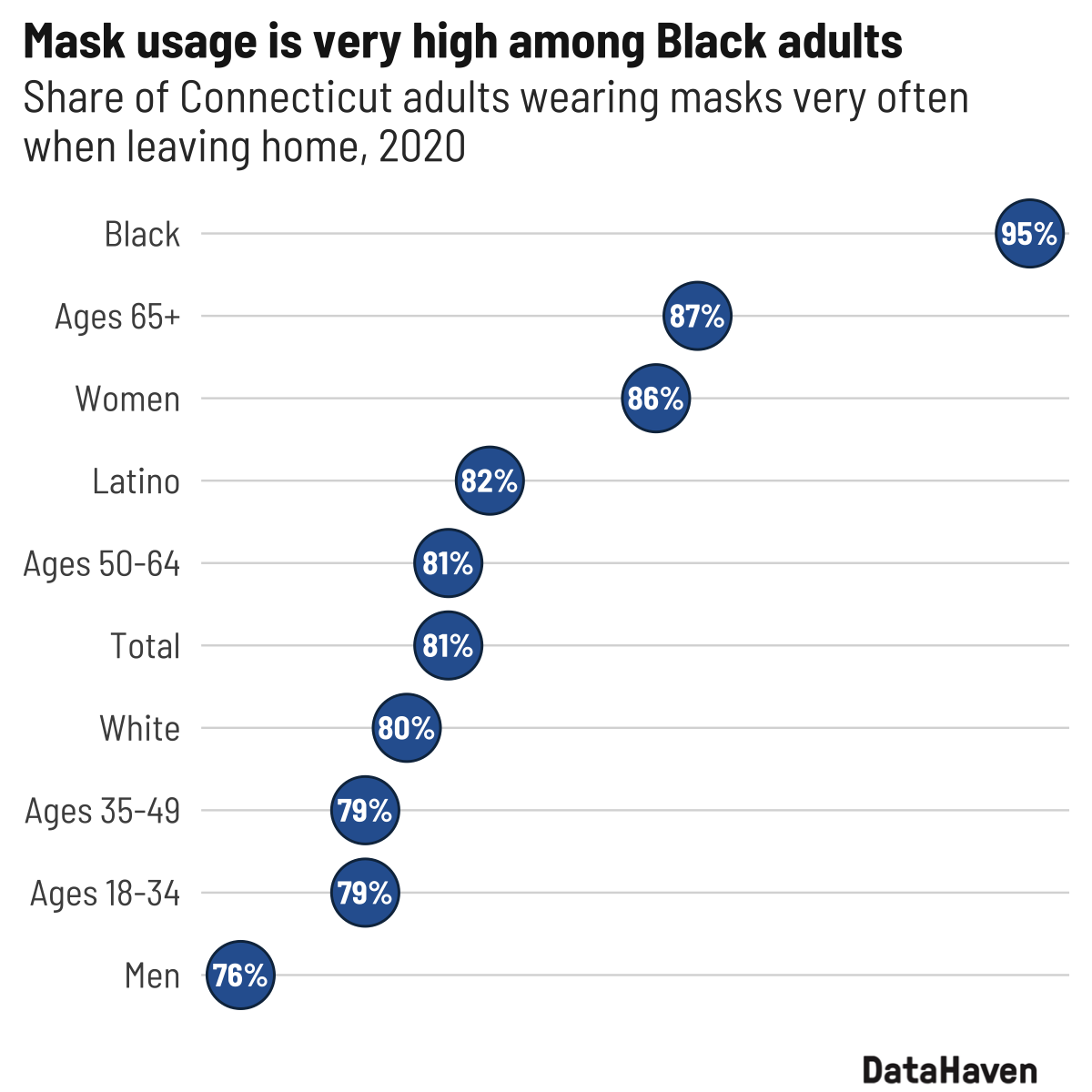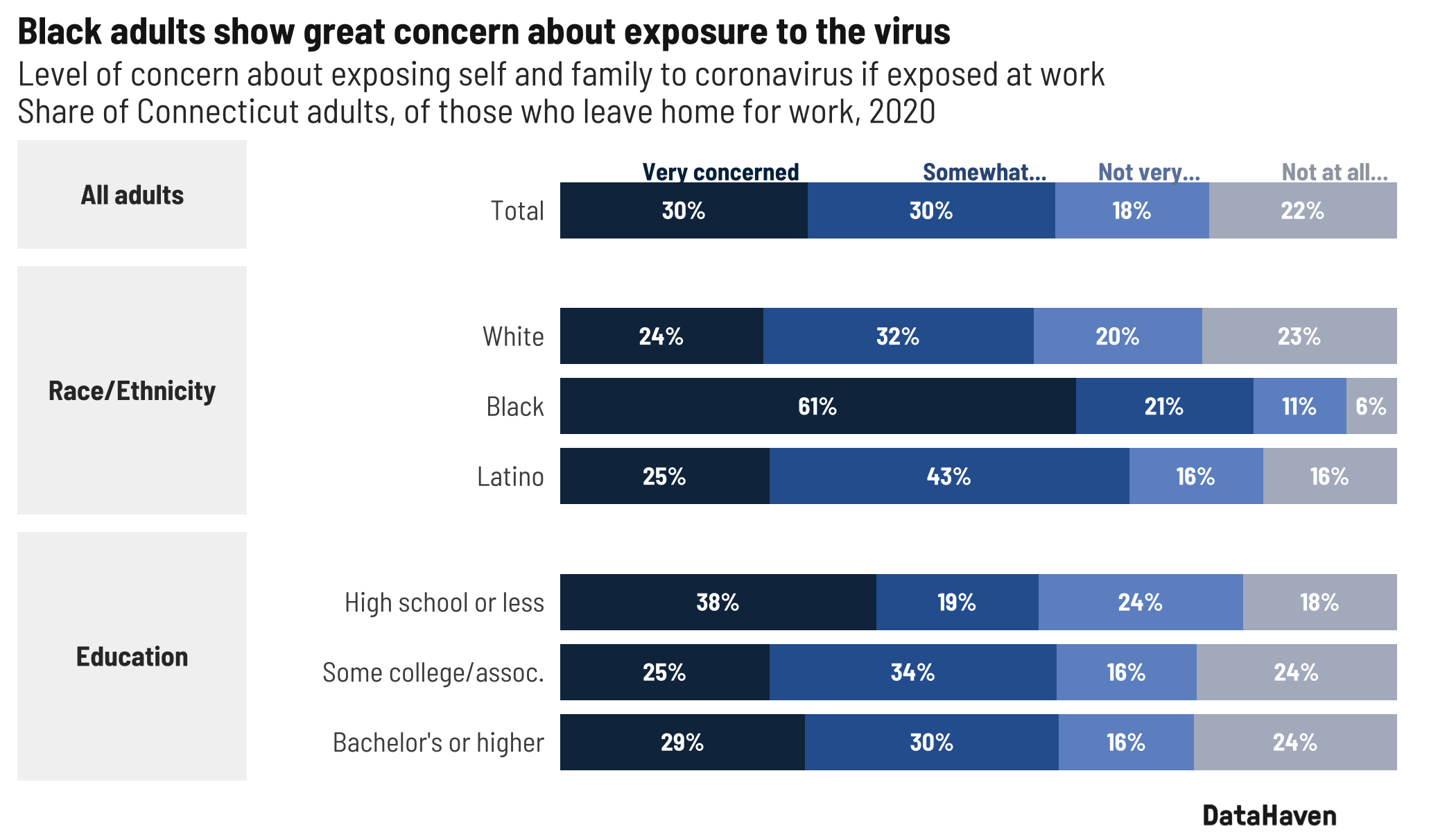Community Wellbeing Survey, Demographics, Economy, Health, Housing
Newsletter: DataHaven survey of 1,108 representative adults provides reliable information on COVID-19’s impact; new housing and health studies
New DataHaven survey provides reliable information to help Connecticut communities understand the impacts of COVID-19
Click here for the full announcement and survey results.
See news and broadcast coverage of survey results from the front pages of the Connecticut Mirror, Hartford Courant, and other outlets here.
In-depth interviews with over 1,100 randomly-selected residents reveal how daily experiences differ by age, gender, race, and geographic area
DataHaven released a comprehensive dataset and new analyses from the fourth wave of its DataHaven Community Wellbeing Survey (DCWS). Considered to be one of the largest community health and quality of life surveys in the United States, the DCWS has provided Connecticut with consistent statistics about health, economic security, and social issues since 2012, based on approximately 35,000 live, in-depth interviews conducted in partnership with the Siena College Research Institute.
The latest results, released today by DataHaven, are based on live interviews of 1,108 Connecticut adults conducted between July 27 and August 18, 2020. The DCWS provides reliable estimates for the state as well as for residents grouped by characteristics such as age, gender, race/ethnicity, income, and the “Five Connecticuts” town type. The program is unique due to its focus on Connecticut neighborhoods and range of questions within a single survey.
In response to the COVID-19 pandemic, the most recent wave of the DCWS included questions about social distancing, access to testing, vaccination, workplace safety, trust in institutions, and the impacts of the pandemic on residents’ health care and economic security.
Thank you to organizations that helped to fund this wave of the DataHaven Community Wellbeing Survey, including The Community Foundation for Greater New Haven, Tufts Health Plan Foundation, Connecticut Health Foundation, Hartford Foundation for Public Giving, United Way of Central and Northeastern Connecticut, Nuvance Health, City of Hartford, Trinity Health of New England, Valley Community Foundation, Greater Waterbury Health Partnership, BJM Solutions, and the Center for Research and Engagement at Yale School of Medicine!
More from DataHaven on this topic:
- Newly-updated interactive data tools, which statewide leaders are using to understand critical issues such as housing, food security, health care, and health outcomes at the neighborhood, legislative district, and regional levels, disaggregated by demographic group
- COVID-19 data analyses and infographics, created in response to requests from local partners
- Towards Health Equity in Connecticut: The Role of Social Inequality and the Impact of COVID-19, a comprehensive 47-page publication by the DataHaven team, released in June 2020
- COVID-19 Reckonings video series, produced by Purple States and DataHaven with residents of Connecticut communities hardest hit by the pandemic because of longstanding inequities
More statewide health and housing studies underway at DataHaven…
New Housing Study Announced
Fairfield County’s Center for Housing Opportunity Partners with Urban Institute and Local Organizations to Lead Statewide Study of Affordable and Accessible Housing in Connecticut
Fairfield County’s Center for Housing Opportunity (FCCHO) has announced a new collaborative project with local and national housing and data experts, including DataHaven, to deliver a statewide needs assessment of Connecticut’s affordable and accessible housing stock.
“This statewide study represents a significant step towards developing a data-driven understanding of housing, a topic that is more important than ever given the emerging research that associates housing conditions with the striking disparities in the impact of COVID-19 across Connecticut neighborhoods,” said Mark Abraham, Executive Director of DataHaven.
Health Equity Data Analytics team presents to Connecticut Office of Health Strategy Health Information Technology Council
On September 17, DataHaven Executive Director, Mark Abraham, presented a project update to the Council, along with colleagues from Health Equity Solutions and Yale University. The Health Equity Data Analytics project seeks to develop strategies and use cases for Connecticut’s evolving health information exchange (HIE) that can help drive progress towards better patient health outcomes at the population level. View the agenda, slides and other public meeting materials here on the CTOHS webpage.


